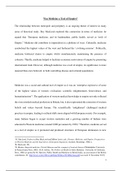Was Medicine a Tool of Empire?
The relationship between metropole and periphery is an ongoing theme of interest in many
areas of historical study. Roy MacLeod explored this connection in terms of medicine; he
argued that "European medicine, and its handmaiden, public health, served as 'tools of
Empire'.1 Medicine did contribute to imperialism in a plethora of ways. Culturally, medicine
symbolised the highest values of the west and furthered the ‘civilising mission’. Politically,
medicine bolstered claims to empire whilst simultaneously maintaining the presence of
colonists. Thirdly, medicine helped to facilitate economic motivations of empire by promoting
international trade. However, although medicine was a tool of empire, its significance is more
nuanced than once believed, in both controlling disease and colonial populations.
Medicine was a social and cultural tool of empire as it was an ‘enterprise expressive of some
of the highest values of western civilisation: scientific enlightenment, benevolence, and
humanitarianism’2. The application of western medical knowledge to empire not only reflected
the overcrowded medical profession in Britain, but, it also represented the extension of western
beliefs and values beyond Europe. The scientifically ‘enlightened’ challenged medical
practices in empire, leading to cultural shifts more aligned with European society. For example,
many Indians began to accept western sanitation and a growing number of Indians were
educated in Western medicine (around 2,000 per annum by 1930).3 Therefore, medicine served
as a tool of empire as it promoted and produced structures of European dominance in new
1
R. MacLeod, Preface in Roy MacLeod and Milton Lewis, eds., Disease, Medicine, and Empire: Perspectives
on Western Medicine and the Experience of European Expansion (London: Routledge, 1988) x.
2
R. MacLeod, 301.
3
D. Haynes, Imperial medicine: Patrick Manson and the conquest of tropical disease (Philadelphia: University
of Pennsylvania Press, 2001) 19; R. Jeffrey, The Politics of Health in India (Berkeley: University of California
Press, 1988) as quoted by M. Harrison, Public Health and Medicine in British India: an assessment of the British
contribution, 28. http://www.evolve360.co.uk/Data/10/Docs/10/10Harrison.pdf [accessed 13 November 2017]
1
, environments. However, this view of medicine as a cultural tool of empire is undermined by
underestimating how deeply frameworks of belief were ingrained in people’s psyche. Thus,
overestimating the extent to which values of the western ‘enlightenment’ were transferred to,
and adopted in, empire. For example, Africans adopted and adapted aspects of western
medicine that worked without allowing this to undermine belief in the efficacy of their
remedies and belief system. Similarly, the Stri Darpan (an Indian magazine) accommodated
both Ayurvedic and western medical views despite their conflicting approaches. 4 So, the use
of medicine as a social and cultural tool of empire is undermined by western medical
knowledge not simply being transplanted into empire, but, selectively incorporated by natives
into their previously existing models of belief.
‘Clinical Christianity’ is another example of medicine as a tool of social and cultural
imperialism, as it helped to legitimise and further the ‘civilising mission’. The ‘work of the
doctor is to open the door, that the evangelist may enter in’- each sick patient was a potential
convert to Christianity.5 The medical missionary effort was vast, with Christian missions
providing ‘vastly more medical care for African communities then colonial states’.6 However,
this is misleading and not representative of the use of medicine within empire, which was
highly varied. For example, within the British Empire, white settler colonies like Australia
‘strove to reproduce the infrastructure of metropolitan institutions’ more than areas like Africa.7
Furthermore, it was not only colonial the medical presence which was inconsistent throughout
4
M. Sutphen, B. Andrews, Medicine and Colonial Identity (London: Routledge, 2003) 22.
5
D. Haynes, 112.
6
M. Vaughan, Curing their ills: colonial power and African illness (Cambridge: Polity Press, 1991) 56.
7
R. Peckham, Disease and Medicine, in The Encyclopaedia of Empire First Edition. Edited by John M.
Mackenzie (China: John Wiley & Sons, 2016) 6.
http://www.history.hku.hk/images/publications/peckham_diseaseandmedicine.pdf [accessed 13 November
2017]
2




